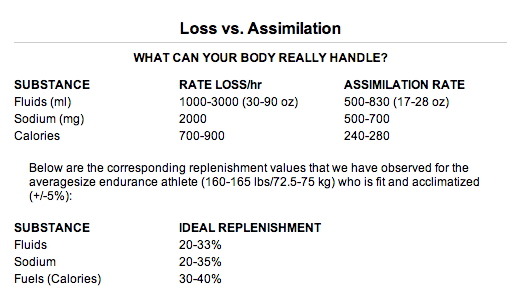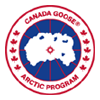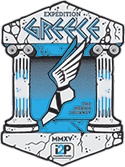
Why Nutrition Matters
Choose Foods That...
- are nutrient dense
- are anti-inflammatory
- support good gut health
- give stable energy throughout the day
- encourage healthy hormonal balance
- give energy for training & competition (performance)
Nutrient Dense Foods
- Eat foods rich in micronutrition
- Micronutrition provides substrate for growth & repair
- Lots of nutrient bang for calorie buck
- Vitamins
- Minerals
- Organic acids
Anti-Inflammatory Foods
- Inflammation is incurred from illness, training, injury or foods(!)
- Limit inflammation from foods
- Eat foods that support repair after training
- Remove foods for at least 3-4 weeks then reintroduce them one by one, noting intolerances or sensitivities
- Food sensitivities can be silent
- Foods known to cause inflammation
- Grains (wheat, oats, barley, rye, etc)
- Dairy (milk, cheese, yogurt, etc)
- Excess sugar
- Food allergies
Foods That Promote Good Gut Healthy
- Your immune system is linked to your gut
- The small intestine is responsible for nutrient absorption
- It should be selectively permeable
- You want a strong barrier
- Foods should feed the good bacteria
- A healthy gut keeps you from getting sick
Foods That Give Stable Energy Throughout the Day
- Consistent energy throughout the day
- Stable blood sugar is important
- No 3 p.m. crashes!
- Eat foods that don’t cause huge spikes in blood
sugar
Foods That Encourage Healthy Hormonal Balance
- Hormones are chemical messengers
- They aren’t "good" or "bad", but can be unbalanced
- Ex: cortisol (stress), melatonin (sleep), thyroid (metabolism)
Foods That Give Energy for Performance (Training & Competition)
- You want to burn fat at rest (stay lean)
- When active, you need to burn glycogen (< 60 min)
- For endurance sports, you need to burn glycogen but also fat. Ex: hybrid car
- Your body needs to efficiently burn fat for long distances!
- “Train low, compete high”
Energy
Glucose
- “Sugar”, stored glucose is called glycogen
- It's used for intense exercise or at the start of endurance event (lasts ~90 min)
- Muscles store up to 400 grams glycogen, liver up to 100 grams glycogen
Problem?
- You quickly burn through that glycogen
- Why not just eat a bunch of sugar during training or your event?
- Your gut can only handle / process so much at one time
- If fat-burning is inefficient, you must supply constant carbohydrate or...BONK
Fat
- Supplies tens of thousands of calories, even in lean people
- It's burned at rest or during low intensity endurance activity
- You must train this to be efficient by not constantly flooding body with excess glucose
Macronutrients
Carbohydrates
- Function = ENERGY
- Starches & sugars = carbs
- Many dietary approaches have way too many carbs & you never train your fat burning system
- Excess carbs are stored as body fat
Daily Carb Ranges (general, adjust up or down based on body size and training volume)
- 1 to 2 g / lb. bodyweight (2.2 to 4.4 g / kg bodyweight)
- Possibly more if running longer
- Post-workout = 50 to 100 g carbs, make up rest in meals
Eat
- Potatoes (white or sweet)
- White rice
- Carb-dense veggies (beets, butternut squash, carrots, plantains, taro, yuca)
- Fruit
- Gluten-free bread, pasta, oats okay but not best
Limit
- Gluten / wheat, rye, barley, other grains
- Baked goods & sweets
- Brown rice, quinoa (unless properly soaked & prepared)
What About Bread?
- Processed carbs, whole grains = pro-inflammatory
- Cheap carbs w/o a lot of nutrition
- Limit bread, pasta, crackers, cookies, cakes, etc.
Fats
- Functions = HIGH ENERGY, proper cell structure & function, hormone balance, fat-soluble vitamin absorption
- Healthy fats (solid) & oils (liquid)
- Fat doesn’t make you fat
- Excess carbohydrate intake leads to body fat accumulation
- Should be in every meal
Daily Fat Ranges (general, adjust up or down based on body size and training volume)
- 1 to 2 g / lb. bodyweight (2.2 to 4.4 g / kg bodyweight)
- Possibly more if running longer
- Post-workout = avoid most fat, slows digestion
Eat
- Coconut milk, flakes, butter, oil
- Grass-fed butter or clarified butter (ghee)
- Olives & olive oil
- Nuts & nut butters
- Egg yolks
- Bacon
Limit
- Trans fats
- Hydrogenated oils
- Margarine & buttery spread
- Industrial oils (corn, soybean, canola, safflower, etc)
Best fats
- Coconut milk, flakes, butter, oil
- Grass-fed butter or clarified butter (ghee)
- Olives & olive oil
- Nuts & nut butters (not peanut butter)
- Egg yolks
Protein
- Function = BUILD & REPAIR, MUSCLE repair
- Meats, eggs, seafood = most protein
- If vegetarian, soaked & properly prepared beans & lentils are the next best
- Athletes need adequate protein!
Daily Protein Ranges (general, adjust up or down based on body size and training volume)
- 0.8 to 1.25 g / lb. bodyweight (1.75 to 2.75 g / kg bodyweight)
- Post-workout = 30 to 60 g protein, make up rest in meals
Eat
- Red meat (beef, lamb)
- Chicken & turkey
- Pork
- Fish & seafood
- Eggs
- Beans & lentils (soaked & properly prepared not recommended as your only source)
Limit
- Soy products
- Processed meats
- Fatty, low-quality meats
Daily Nutrition
- Good choices daily set the stage for performance
- As much as possible, choose foods that are
- whole, nutrient-dense
- unprocessed
- anti-inflammatory
Every Day, Eat...
- 3 large meals vs. many small
- Takes burden off digestive system
- A meal = a balanced plate of protein, carbs, fat
- 1-2 palm-sized portions of protein or as many eggs as you can fit in your hand per meal
- Fill your plate with veggies (1-2 servings of fruit a day) per meal
- Add fat in every meal: 1-2 thumb-sized portions of cooking fat, 1 closed handful of nuts, 1 open handful of olives or coconut flakes, 1/2-1 avocado, 1/4-1/2 can coconut milk
- Train more? Eat more.
Training & Recovery
- 3 meals + pre-workout + post-workout
- 3 meals + post-workout (if early AM training)
- If you train long (1 hr+), you must eat / drink during
- Post-workout = mandatory small meal
Pre-Workout
- Usually 30 to 90 min before workout
- Protein + fat, small portion
- Or protein + fat + carb, small portion
- If 3 to 4 hours prior to your workout, eat a regular meal
- Examples
- jerky + a piece of fruit
- hardboiled egg + nuts
- shake with protein powder + coconut milk
- leftover meat + olives
During Workout

Conclusion: You cannot take in as much nutrition as you’re using up!! (Source: Hammer Nutrition)
- If training 1 to 3 hours = complex carb + fast-digesting fat
- If training 3+ hours = complex carb + fast-digesting fat + protein
- Cannot replace what’s being burned in 1:1 ratio, stomach will fill up = cramps
- Solid or liquid food works
- 1 to 3 hours = complex carb + fast-digesting fat
- 3+ hours = complex carb + fast-digesting fat + protein
- Cannot replace what’s being burned in 1:1 ratio, stomach will fill up = cramps
- Complex carbs are best, not simple sugars
- More easily digested, less stomach distress, fewer blood sugar peaks / crashes
- Ex: Blended sweet potato with coconut milk
Post-Workout
- As soon as possible after workout is over
- Within 30 min is best
- Protein + carb
- Ex: protein shake + starchy veggie like sweet potato
- Leftover meat + potatoes
- 30 to 60 g protein, 50 to 100 g carbs
- Minimal fat, don’t want to slow digestion of post-workout nutrient assimilation
Hydration
- It's a necessary component of training
- Environmental conditions & unique physiology change needs per person
- Hot, dry, humid conditions
- Excessive sweater
- Large body mass
- Roughly 20-25 ounces / hr (600-750 mL / hr)
- Hydrate especially when training is 30+ min
- Pre-workout: ~10-12 ounces / hr (300-350 mL / hr)
- During training: ~20-25 ounces / hr (600-750 mL / hr)
- Post-workout: ~16 ounces / hr
- Don’t wait until you feel thirsty!!
Dehydration
- No bueno!
- Affects mental acuity, power output, rate of perceived exertion (RPE), endurance
- Goal = lose < 2% bodyweight during training or event
- Drink before, during, after but don’t overdo it
- Use electrolytes
Electrolytes
- Sodium & potassium are most important
- These are lost through sweat
- Consume electrolytes in your water to prevent water loss during training
- Various forms...drops, tablets, coconut water + pinch of salt
Expedition
- Preparation = eat & drink as normal
- Carb loading unnecessary
- Test out foods prior to expedition
- Eat & drink according to long training reco’s
- Eat a bit of extra carbs ~30-60 min prior to run
- Find comfortable level of caloric & hydration intake
- Take in fluids (with electrolytes)
- Take in protein if over 3 hours running
- Take in slow-digesting carb & fast-digesting fat (coconut is great)
- Eat & drink even if you don’t feel hungry...
- ...but don’t over do it!
- Eat ASAP after you finish for the day
- Refueling is critical
- Bias toward whole, nutrient-dense foods
- Avoid foods you don’t tolerate well
- Plan, plan, plan
To Summarize
- Good performance hinges on the sum of good daily choices with food (and training and sleep)
- Perfection isn’t the answer
- Make great choices a majority of the time
- Even the best recommendations may not work exactly for you
- Test, TEST and RE-TEST
- Pay attention to how you feel, recover and perform in training
- Your best results depend on daily attention to:
- food type
- food timing
- food ratios
- food tolerances







